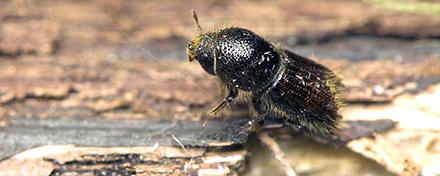 The bark beetle has been a headache for Andreas Voss, chief wood marketer of Germany’s most populous federal state, North Rhine-Westphalia, but recently things turned for the better. An infestation of the pest in the state’s spruce forests has created unsalable volumes of lumber until China emerged as a buyer. Source: Nikkei Asian Review.
The bark beetle has been a headache for Andreas Voss, chief wood marketer of Germany’s most populous federal state, North Rhine-Westphalia, but recently things turned for the better. An infestation of the pest in the state’s spruce forests has created unsalable volumes of lumber until China emerged as a buyer. Source: Nikkei Asian Review.
North Rhine-Westphalia spruce forests have been hit by a double whammy over the last three years with unseasonably dry weather interspersed with fierce storms that created the perfect breeding grounds for the bark beetle.
Since 2018, 21 million cubic meters of spruce trees have become infested. But China has stepped in to buy up almost 1.2 million cubic meters of German softwood logs in the second quarter of this year, up 143% from a year ago.
Those figures meant that China had bought half of all German softwood log exports, according to Seattle-based Wood Resources International.
Before 2018, German logs had virtually never been shipped outside of Europe. But the infestation has sent prices for German spruce spiralling down to 45 to 50 euros ($53-$59) per cubic meter, half pre-2018 levels.
Asian buyers, however, have not been put off and since 2018, log exports from Central Europe to the region have become a new growth area.
“The longer the damaged trees remain unharvested in the forests, the more bark beetles there are, with the insects now having three annual breeding cycles compared with only one in the past,” Mr Voss said.
“The bark beetle intrudes the trees to just beneath the bark, so if we harvest the logs early enough, they can still be used for construction in China.”
The rapidly increasing volumes of North Rhine-Westphalian spruce logs destined for China are loaded into shipping containers and brought by truck and river boats to German, Dutch or Belgian ports, where insecticide is blasted on them to kill the pests.
Germany’s JKI Federal Research Center for Cultivated Plants is also running new tests on logs in containers to ensure that the treatment has worked. China’s forests, have in the past, been devastated by bug infestations.
Overall, Europe accounted for 23% of total Chinese softwood log imports in the second quarter, a surge from just 2% in the same period in 2018.
New Zealand, Australia and Russia have traditionally been China’s main import sources, but their shipments had fallen by 1%, 16% and 22% respectively in the same period. US lumber exports to China also fell by 57% in 2019 to $125 million from a year ago, according to the US International Trade Commission.
China in June 2019 hiked import tariffs on US softwood lumber in retaliation for the US raising tariffs on Chinese imports as part of President Donald Trump’s trade crusade against Beijing.
However, Canada has borne the brunt of the decline, with its softwood exports to China dropping by 61% in the April-June period to just 200,000 cubic meters, according to WRI. Canadian forestry companies are fearing a further drop in business after China complained mid-June it that it found insects in Canadian hardwood and softwood log imports.
Following the arrest of Huawei Technologies Chief Financial Officer Meng Wanzhou in Vancouver in December 2018, China has blocked Canadian canola seed shipments citing pest concerns, and temporarily suspended imports of Canadian pork and beef. These retaliatory steps have given Canadian forestry companies cause to worry that the latest Chinese nitpicking precedes an official ban.
Harry G. Broadman, managing director at Berkeley Research Group and a former US assistant trade representative, recommended the collection of more data to determine if Canadian softwood exports were more severely infested by bugs than lumber from other countries.
Whatever the political motives, the Central European softwood export boom is unlikely to last beyond the middle of this decade. The US International Trade Commission predicts that there will be a supply shortage in Europe in the future, reflecting early harvests necessitated by the bark beetle infestation.
European sawmills are reaching production capacity, and exports of processed lumber, wood chips and wood pulp are expected to slow.
“With tens of billions of bark beetles on the move, there will be no spruce left for export in Germany in five years if the calamity trend stays as dramatic as it is,” said North Rhine-Westphalia’s chief wood marketer Voss.





